It is hard to shake off the images of the past few days. On the one side there was an outpouring of joy at the announcement that the National Centre of Physics at Quaid-e-Azam University will be renamed after Pakistan’s long-neglected Nobel prize winner, Professor Abdus Salam. While on the other, just as this news was breaking, a photograph flashed across social media of a sprawl of men laying face down on an immaculately kept lawn during a police raid on an office complex in Rabwah under the derisory pretext of concerns about the publication of hate-material, as if any minority group in Pakistan could ever get away with such brazen insurrection. What Salam and these men have in common is their faith, they are Ahmadis, yet the country cannot find it within itself to honour one without humiliating the other.
These scenes were a reminder, if ever one was needed, that to be an Ahmadi in Pakistan is to be hated and forgotten at the same time. It is to deal with extremes of existence that swing from venom to faceless otherness before beginning the loop all over again and nothing in between. That is just how history has taken its course here, so you tend not to probe too deeply into your situation in case you cannot bear the answers. The answers end up coming anyway, making a part of you stronger while the other part of you ebbs away.
Eventually you learn to live with the divisions inside of you. It is, however, not enough. There are laws which say that you cannot be yourself, no matter how fractured that self is. You can practice your faith, but only if you call it by another name; you can greet people but only with alien words; you can vote, but only if you negate your own identity; and you can breath, but only if you choke on the same air that is meant to sustain you.
These moments of erasure offer, at the very least, a kind of relief. For the forgotten, every layer of their world is accessible even as they are lost inside of it. You find that it is better to be a ghost than a perpetual foreigner in your homeland.
The problem though with being ignored is that you tend to disremember the swell of hatred that seethes underneath the surface of your life. In the midst of calm, there is turmoil; in the midst of happiness, there is pain and at its worst, in the midst of life there is death. The more you are forgotten the more you too forget that you are only human for small moments at a time.
In seeking to find a place for itself in the world the only country you have ever called your own has created an existential imperative to recognize itself through your hatred. The motives for loathing you have changed over time, but the animosity has remained constant. Without you Pakistan cannot survive and with you it’s very survival is at stake. Therefore you are everything and nothing but no real part of anything at all.
What everyday life is to you is unfathomable to them. They know nothing of what it means to live on the outer edges of acceptance, where the little space afforded to you is forever in a state of upheaval. The constant shifts are exhausting – hatred always is. You know this tiredness well because it moves you to persevere.
What is also true is that this ghastly bigotry has damaged them more than it has you. They have gained nothing from their hate, except a catalogue of cruelties which beat against their conscience. They may deny it to themselves but the unspeakable truths tend to holler the loudest through the passages of history. One day they will be forced to listen to the things they currently refuse to hear.
Until then these are the sounds you cannot escape for they go unheard by everyone else. They are your life, both past and present, and all that is in the storehouse of your memory. But this noise is not in the tenor of who you really are. You are certain that you will outlast it. After all I am still here you tell yourself. And sure enough you are still here.






